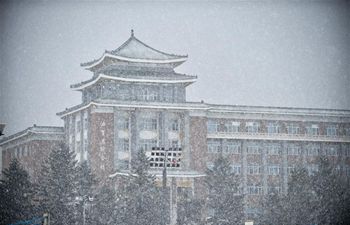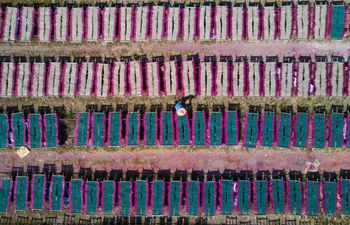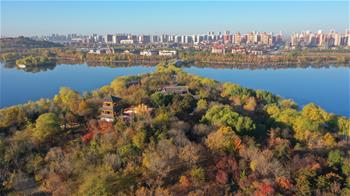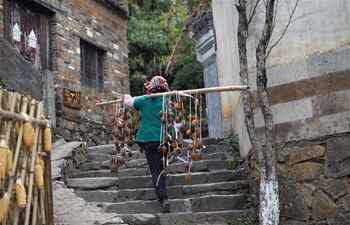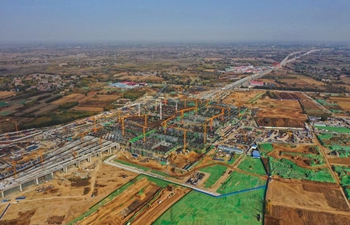
Prisoners work in a workshop in Tora Prisons Complex on the outskirt of Cairo, Egypt, Nov. 11, 2019. The third Forum for Egyptian Prisons was held on Monday. (Xinhua/Ahmed Gomaa)
by Marwa Yahya
CAIRO, Nov. 13 (Xinhua) -- Inside a workshop for manufacturing metal furniture in Tora Prisons Complex on the outskirt of the Egyptian capital, Waleed Ibrahim, a prisoner in his early 40s, was making a steel bed.
"Finding work in the prison has completely changed my life. I found something useful to do," Ibrahim told Xinhua.
"I feel proud when I find the production of the prison's furniture factory is sold in famous exhibitions," he said.
Ibrahim, who has spent almost five years of his six-year prison term after being convicted in smuggling drugs, said he can earn 900 Egyptian pounds (nearly 56 U.S. dollars) monthly.
"My income is enough for buying some food," and sometimes he could save some 400 pounds and send it to his family.
"Made in prison" has become a slogan that cheers some prisoners, said a female prisoner who was displaying her fabulous accessories on a long table.
"I learned also to sew clothes, bags, and festoon bed sheets," said Manal, 33 years old, noting that the prices of the "made in prison" products are cheaper than similar commodities on the market.
She expressed happiness when showing her products outside the prison in some exhibitions, noting that "my accessories are highly praised by the clients."
During the third Forum for Egyptian Prisons that was held on Monday, Alaa al-Ahmady, assistant to interior minister for the media sector said "the Interior Ministry is keen to adopt a punitive philosophy that seeks reforming and rehabilitating the prisoners' life to turn them useful people after being released."
He stressed that modernizing prisons is based on developing facilities, promoting healthcare and enhancing the cultural, religious and sports activities.
"We have been seeking to amend some national legislations in accordance with the international charters, along with bolstering the capabilities of the security staff working in prison sectors, to help the prisoners accept their life behind the bars and prepare for the life after prison," he said.
Outside the Tora Prisons Complex's hospital that houses a lab and seven different treatment departments, a playground was located.
Two teams, each with five prisoners, were playing the country's popular sport, football.
Adel, with 15 years in jail over robbery, said "playing football is a kind of relief from long days in prison."
"I breathe freedom, feel like any ordinary person, and spend good time in practicing some sports," he said after scoring two goals.
Ashraf Ezz al-Arab, assistant to interior minister for prisons sector, said "the rehabilitation of prisoners' life is embodied in training them to work in farms, factories, and various projects."
"We are working on upgrading the production process on 3,400 acres in several industries including the aquaculture, and poultry," the security top official said.
He pointed out that the prisoners are allowed to continue their education, adding "around 8,215 detained persons have been enrolled in the current academic year."
Commenting on some reports that doubt the legal measures taken against many prisoners, he emphasized "all the prisoners have been put in jails based on legal decisions."
He added 20,188 indebted prisoners were released after their debts were paid from June, 2014 to Nov., 2019.
Meanwhile, 19,490 were released upon presidential pardon decrees in 2019, while 15,000 were conditionally freed in the same year, added Ezz al-Arab.
"The release of that number of former prisoners contributed to improving the capacity of prisons and the healthcare provided for prisoners," he said.
The Health Ministry has been conducting Hepatitis C virus for 5,000 prisoners. In Addition, the Interior Ministry is working on signing a protocol with the concerned authorities to treat those jailed for drug use, Ezz al-Arab added.
